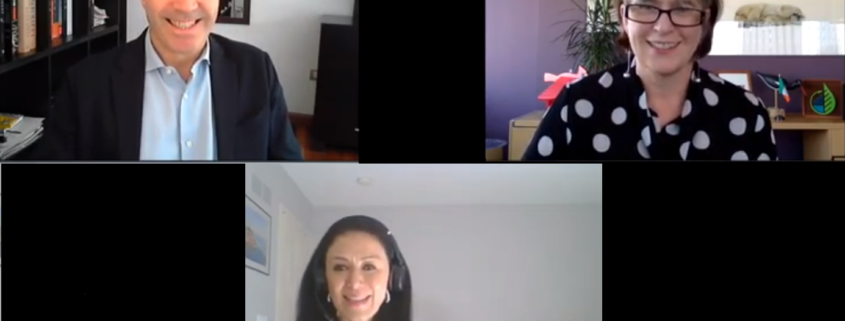The Great Reset: Now is the Time to Build Back with Nature for a Resilient Future — A WHC Connect Recap
Earlier this year, in the WHC President’s Blog post What’s next for nature?, WHC President Margaret O’Gorman considered the ways in which nature has intersected with the 2020 pandemic. She concluded that “nature has given us an opportunity to reset our relationship with it” and that we have a prime opportunity to build back stronger.
A few months later during WHC Connect 2020, in a session aptly titled The Great Reset: Now is the Time to Build Back with Nature for a Resilient Future, Margaret moderated a discussion with Geraldine Barnuevo, Senior Manager of Environmental Strategies and Sustainability at General Motors (GM) and Vicente Saiso, Corporate Director of Sustainability at CEMEX. The panelists reflected on how the private sector’s relationship with nature has grown through the years and how it will continue to evolve.
Geraldine explained that GM’s initial commitment to sustainability focused on reducing their environmental footprint. Over time, however, they began to consider the ways in which they could not only prevent environmental harm, but also implement good through actions like the biodiversity and education initiatives that have led to WHC Conservation Certification® at many of their sites.
These actions have not only established trust with customers but have also strengthened the company’s relationship with its own workforce. Geraldine noted that personnel from non-environmental backgrounds often find nature-based initiatives more approachable than other sustainability measures, and that younger generations of employees are especially attuned to these efforts. As such, continuing this engagement will be an invaluable way to attract and retain talent.
Moving forward, GM will work toward goals like producing more electric vehicles —operations at their Detroit-Hamtramck site, for instance, are shifting entirely toward the pursuit. This goal, however, cannot be accomplished by one industry alone. Geraldine explained that a shift to electric vehicles will require the support of suppliers, as well as governmental support to provide the infrastructure consumers need to charge their cars.
Vicente likewise discussed the importance of collaboration. He stressed the importance of setting “clear and ambitious” objectives, and then working with other entities, such as NGOs and environmental experts, to achieve them. Drawing from CEMEX’s involvement with Innovandi (a consortium seeking climate solutions within the cement and concrete industry), he stated that organizations should also be prepared to collaborate with others in their own sector.
The company’s biodiversity journey started with a desire to compensate for their environmental footprint. This led to the establishment of the 347,000–acre El Carmen Nature Reserve on the U.S./Mexico border. The vegetation present in the reserve supports the company’s goal of achieving carbon neutrality by 2050, as creating natural carbon sinks is a critical piece of the solution.
Over time, CEMEX began to adopt on-site practices to decrease the environmental footprint of their operations. Vicente expressed excitement over breakthrough moments in which a site’s leadership has moved past the mindset of sustainability as a mandate, instead recognizing it as a critical part of business and something of which they can take ownership.
Today, CEMEX programs worldwide have achieved WHC Certification, and the company recently became a signatory to Business for Nature, a global coalition acting on a business-oriented case for reversing nature loss. Through the years, CEMEX has also found new opportunities for community education and engagement. He noted that, with the popularity of outdoor recreation in 2020, many have a newfound appreciation for nature and its needs. Moving forward, it will be critical to keep this momentum going.
Within CEMEX, several factors help employees maintain their enthusiasm for biodiversity, including the WHC Awards that the company has received. Vicente stated that these achievements have encouraged the team to keep improving their efforts. During this session, he accepted the Corporate Conservation Leadership Award on behalf of his company. This top award honors one company’s overall achievement in conservation efforts. A full list of 2020 WHC Award recipients and finalists can be found here.
Recordings of The Great Reset and all other WHC Connect 2020 sessions are available on the WHC Website.

